
Indian cuisine is known for its use of a greater variety of vegetables than many other cuisine in the world. However, the undeniable essence of good Indian cooking revolves around the appropriate blend of mixed spices. Spices have always been considered to be India’s prime commodity. Base ingredients of such mixed spices include Coriander, Cumin, Turmeric, Red Pepper, Nutmeg, Mustard, Saffron, Cinnamon, Cardamom, Ginger Powder, Paprika, Mace, Cloves, Black Pepper etc. (Interestingly, Saffron is the most expensive spice on earth- it takes over 50 000 hand-picked Saffron flower buds to make just one pound of packaged product!) Just as Japanese sushi relies on the freshness of the meat and Chinese food relies on the various sauces to impart the right flavor and taste, Indian food relies on the skill to subtly blend these spices to enhance rather than overwhelm the basic flavour of a particular dish. It is interesting to see an Indian cook at work, with a palette of spices, gratuitously sprinkling these powders in precise pinches into the dish over an open fire.
Early on, Hindu and Muslim settlers brought with them the techniques that set the groundwork for traditional Indian cuisine. Over time, history would inevitably play a huge role as the Portuguese, Persians and British all made important contributions to make present day Indian fare the mélange it is today.
In such a large country, regional variations are bound to be present. A typical North-Indian Meal would consist of Chapatis or Rotis, fried foods, and is heavy on flour and grain-based products. In the south, food is largely non-greasy, roasted and steamed. Rice is the staple crop that forms the basis of every meal. Just as in Oriental meals, tea is served after most meals. Sweets and desserts are very popular in all regions and are usually cooked in a lot of fat.
An integral part of Indian cuisine is the way in which it is consumed. Traditional cuisine has certain customs, like sitting on floor or on very low stools, another custom is to eat with your fingers (but only using the right hand!). The variety of Indian cooking is immense, as it is colourful and aromatic. No wonder it is one of the most popular cuisines in the world.
The New Asian Village is one of Edmonton's most well-known Indian restaurants. Located on Saskatchewan Drive, it has a great view overlooking the river valley and is a particularly lovely setting at night. They have a great lunch buffet on weekdays from 11:30- 2:30 for under $10.

The entrance to New Asian Village on scenic Saskatchewan Drive.
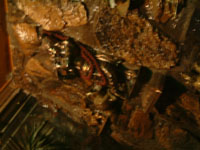
Upon entering, diners are greeted with a waterfall and many native sculptures.
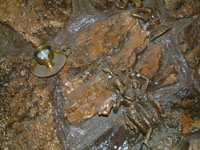
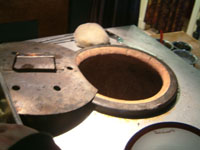
Giant clay tandori oven used to prepare roasted meats and naan bread.
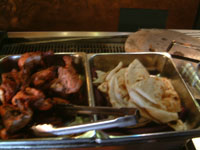
Tandori chicken and naan bread.
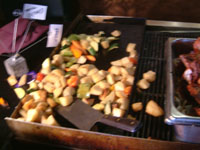
Open grill with roasted potatoes.
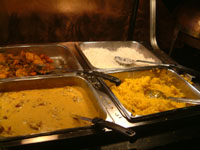
Two types of rice (white and saffron) with curry and potatoes.
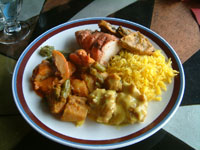
My first plate with the above items.
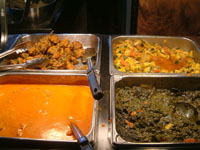
Butter chicken, fried eggplant, and two vegetarian dishes.
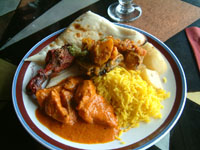
My second plate with the above items.
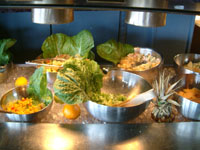
A fresh salad bar.
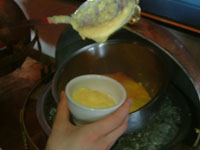
Ending the occasion with some dessert: rice pudding and custard.
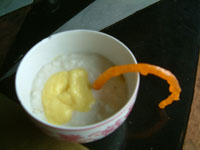
My artistry at work. Presentation is everything!
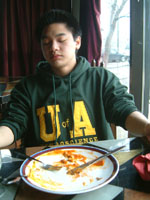
My friend Jarome- getting sleepy after a 4 plate;3 dessert day.
Overall a great experience and truly exceptional food. Servers were friendly and always present for refills or to take away plates. It was not the biggest selection I've seen for an Indian restaurant; but its high quality fare and freshness more than makes up for it. Be sure to starve yourself the morning before you go because, after all, it is a buffet and it is open for 3 hours. If you liked this restaurant, also try Punjab House on 34th avenue.
Asiarecipe.com: Food Tour of India
AllRecipes.com: Indian Chicken Recipes
University of Alberta Restaurant Review
Rob's Edmonton Restaurant Review
InfoEdmonton.com Restaurant Guide
MyTravelGuide.com Edmonton Restaurant Review
Frommer's Edmonton Restaurant Guide
RealEats.com Alberta Restaurant Review
All flags courtesy of BafaBandiere
Southeast Asia map courtesy of Vipbackpackers.com
Last updated: April 14, 2005